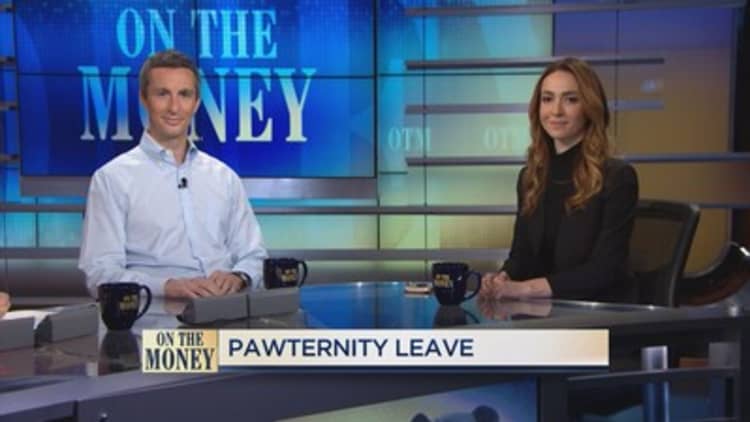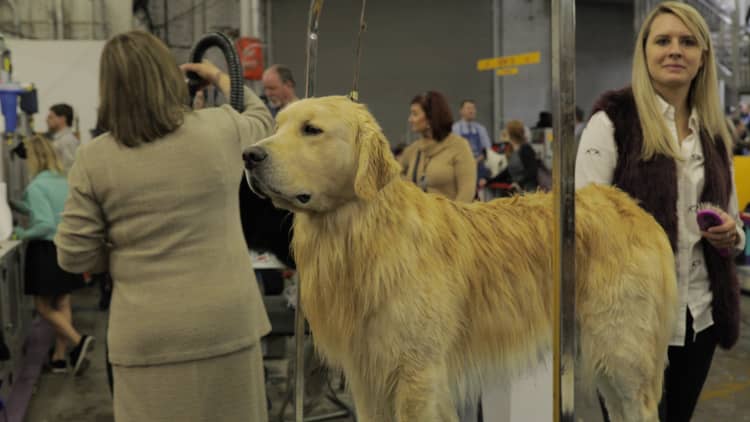As workers' lives change so do their work perks. That's why one marketing firm in Minnesota has started offering "furternity" leave for all new pet moms and dads.
The policy is part of a growing trend in pet friendly workplace policies and a way to offer workers flexibility they might not have otherwise.
At Minneapolis marketing firm Nina Hale, furternity leave allows new pet owners to work remotely for a week after adopting a pet. The policy gives pet parents the opportunity to bond with their furry friends as they acclimate to new surroundings.
Nina Hale's pet-friendly policy was inspired in part by senior account manager Connor McCarthy, 26. He and his girlfriend were in the process of adopting a Goldendoodle earlier this year, however, his partner's job was not suitable for remote work.
Knowing that switching homes "can be a stressful situation" for a dog, he told the New York Times, McCarthy sought permission to work from home for one week.
His request was approved and in July, was officially included in an overhaul of employee benefits.
"It's all about giving employees that flexibility," says Allison McMenimen, executive vice president at the firm. "Even if people aren't leveraging these new perks, they appreciate that the company is willing to accommodate their lives."

A number of companies already offer pet-friendly offices. At Amazon's Seattle headquarters, the company says more than 6,000 dogs share the workspace with employees. Dogs enjoy a floor designed for pet play in one of the company's buildings and the company even opened a special dog park that's also open to the community.
Google declares itself a "dog company" in its code of conduct and welcomes dogs (not cats) in the office.
Minnesota agency Nina Hale isn't the first to have a "pawternity" policy. Data company mParticle, headquartered in New York City, offers employees two weeks of paid time off when they adopt a rescue dog.
Nordic company Musti Group also offers pawternity. Its CEO David Rönnberg said in the Daily Mail that the first days with a new pet can be exhausting. Sleepless nights are as common among new pet owners as they are for those with human infants, he explained.

Pet friendly benefits like pet leave, pet bereavement and pet health insurance are growing in popularity, Steven Feldman, an executive director at Human Animal Bond Research Institute (HABRI), tells the Society for Human Resources Management. It's a "signal you're looking at the employee's entire family," he adds. It's also a way to entice young workers, the largest pet-owning generation.
McMenimen notes that staffers can be weary of companies that offer perks which mostly keep them at the office, such as free lunches or post-work dinners. Benefits that acknowledge staff needs outside the workplace can have more meaning, she says.
Recent data seems to agree. In fact, 90 percent of staffers in pet friendly workplaces say they feel connected to their company's mission, according to a survey conducted by Nationwide Insurance and HABRI.
Those with pet-friendly workplaces, the survey found, were more likely to want to stay at their employer for the long-term and even reported more positive relationships with their bosses.
Nina Hale also offers up to 12 weeks of paid traditional paternity and maternity leave. In its recent benefits package rollout, the company added a $100 health and wellness stipend. Each quarter, employees can expense up to $100 worth of payments for anything that contributes to their wellbeing— ranging from manicures to even babysitting fees. "We want to make sure that these aren't just perks that manipulate you into staying at the office for 60 plus hours," says McMenimen.
Although Nina Hale doesn't ask for verification that an employee is in fact adopting a pet, McMenimen says employees must go through a formal process when requesting to work from home, coupled with managerial approval.
Organizations looking to implement similar policies can start with a three-month pilot program, McMenimen suggests, which details what the company is providing and what it needs from employees to make it permanent. "That way, you're setting up clear expectations," says McMenimen. "And at the end of those three months, you'll know what worked well and what aspects need to be tweaked."
Like this story? Subscribe to CNBC Make It on YouTube!
Don't miss: From Mark Zuckerberg to Elon Musk, meet the dogs of tech titans



